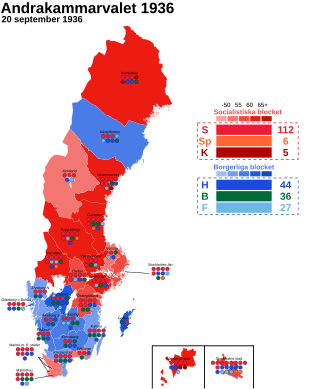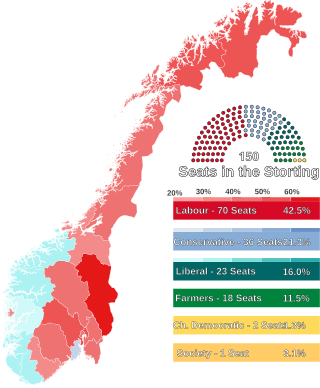
Federal elections were held in Germany on 28 October 1884. The Centre Party remained the largest party in the Reichstag, with 99 of the 397 seats. Voter turnout was 60.5%.

General elections were held in Sweden on 20 September 1936. The Swedish Social Democratic Party remained the largest party, winning 112 of the 230 seats in the Andra kammaren of the Riksdag.

Parliamentary elections were held in Norway on 19 October 1936, the last before World War II and the German invasion of Norway. The result was a victory for the Labour Party, which won 70 of the 150 seats in the Storting.

General elections were held in Brazil on 1 March 1918. The presidential elections were won by former President Rodrigues Alves, who received 99% of the vote. However, he died of the Spanish flu in 1919 before he could take office. Vice-president Delfim Moreira became Acting President until fresh elections were held on 13 April 1919.
Parliamentary elections were held in the People's Republic of Albania on 28 May 1950. Candidates were nominated by the Democratic Front, which was an organization subservient to the ruling Albanian Party of Labour. The Front won all 121 seats, with voter turnout reported to be 99.4%.

Presidential elections were held in Algeria on 10 December 1976. Incumbent Houari Boumediene, leader of the National Liberation Front, was the only candidate, and was elected unopposed with 99.46% of the vote.

Presidential elections were held for the first time in Algeria on 15 September 1963. Incumbent Ahmed Ben Bella of the National Liberation Front was the only candidate, and was re-elected with 99.61% of the vote, based on an 89% turnout.

Presidential elections were held in the United Arab Republic on 15 March 1965. The election took the form of a referendum on the candidacy of Gamal Abdel Nasser, who ran unopposed. He allegedly won with almost seven million votes, and only 65 against. Voter turnout was stated to be 99%.

Presidential elections were held in Syria on 2 December 1991. There was only one candidate, Hafez al-Assad, with voters asked to approve or reject his candidacy. A reported 99.99% of voters voted in favour, with a turnout of 99.1%.

An independence referendum was held in Azerbaijan on 29 December 1991, three days after the collapse of the Soviet Union. The result was 99.8% in favour, with turnout reported to be 95%.
General elections were held in Siam on 29 January 1948. Following the 1947 coup, the unicameral parliament elected in 1946 was abrogated. It was replaced by a bicameral parliament with a 100-seat appointed Senate and a 99-member House of Representatives.

Parliamentary elections were held in Bulgaria on 8 June 1986. The Fatherland Front, dominated by the Bulgarian Communist Party, was the only organization to contest the election; all candidate lists had to be approved by the Front. The Front nominated one candidate for each constituency. Of the 400 candidates 276 were members of the Communist Party, 99 were members of the Bulgarian Agrarian National Union and the remaining 25 were unaffiliated. Voter turnout was reportedly 99.5%.

Parliamentary elections were held in Bulgaria on 7 June 1981. The Fatherland Front, dominated by the Bulgarian Communist Party, was the only organisation to contest the election; all candidate lists had to be approved by the Front. The Front nominated one candidate for each constituency. Of the 400 candidates 271 were members of the Communist Party, 99 were members of the Bulgarian Agrarian National Union and the remaining 30 were unaffiliated. Voter turnout was reportedly 99.9%.

Parliamentary elections were held in Bulgaria on 30 May 1976. The Fatherland Front, dominated by the Bulgarian Communist Party, was the only organisation to contest the election; all candidate lists had to be approved by the Front. The Front nominated one candidate for each constituency. Of the 400 candidates 272 were members of the Communist Party, 100 were members of the Bulgarian Agrarian National Union and the remaining 28 were unaffiliated. Voter turnout was reportedly 99.9%.

A constitutional referendum was held in Bulgaria on 16 May 1971. Voters were asked whether they approved of a new constitution. The new constitution defined Bulgaria as a "socialist state of the working people from the cities and the villages", led by the Bulgarian Communist Party in cooperation with the Bulgarian Agrarian National Union. The result was reportedly 99.7% in favour, with a voter turnout of 99.7%.
Parliamentary elections were held in Norway in 1838. As political parties were not officially established until 1884, all those elected were independents. The number of seats in the Storting was increased from 96 to 99. Voter turnout was 50.2%, although only 6% of the country's population was eligible to vote.
Parliamentary elections were held in Norway in 1841. As political parties were not officially established until 1884, all those elected were independents. The number of seats in the Storting was increased from 99 to 100. Voter turnout was 51%, although only 5.5% of the country's population was eligible to vote.
Presidential elections were held in Colombia on 14 February 1926. The result was a victory for Miguel Abadía Méndez of the Conservative Party, who received 99.9% of the vote. He took office on 7 August.
Presidential elections were held in Colombia on 11 February 1934. The result was a victory for Alfonso López Pumarejo of the Liberal Party, who received 99.6% of the vote. He took office on 7 August.

The People's Party was a political party in Bulgaria between 1894 and 1920.











